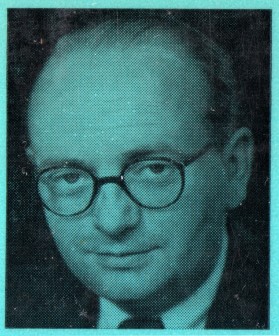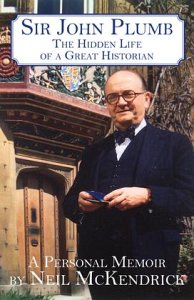Most of my other Reviews Selected reviews, grouped by subject:- Film, TV, DVDs, CDs, media critics | Health, Medical | Jews (Frauds, Freemasons, Religions, Rules, Wars) | Race | Revisionism | Women | Bertrand Russell | Richard Dawkins | Martin Gardner | H G Wells

1950 photo I think (from the Penguin/ Pelican book cover)

Cover of Sir John Plumb: The Hidden Life of a Great Historian by N McKendrick
J H Plumb (1911-2001) Another fake historian
John Harold Plumb was born in Leicester, and is stated to have had origins in poverty. Whether this is true—and anyone familiar with Miles Mathis' writings will be aware that hidden wealth and connections are common enough—Plumb seems to have attended what was University College, Leicester, later promoted to Leicester University. This seat of learning was connected with the Attenboroughs.My interest in Plumb, now, was sparked by the desire to check Kevin MacDonald on the supposed monogamy of influential whites; I remembered, I think in Plumb, a passage on George II keeping locks of hair from innumerable women, I'd guess visiting George II at Hampton Court. I couldn't relocate the paragraphs, but I did realise that Plumb, like A J P Taylor and many others, was selected as one of many lying-for-Jews official historian.
Plumb, Taylor, and other must have been selected to appear 'mature' after the next war planned by Jews, the 'Second World War'. He did 'research' under G M Trevelyan on the 'social structure of the House of Commons' in the reign of King William III, in about 1936. This was William of Orange, who of course eased the Jewish 'Bank of England' into its grasping life. Trevelyan turned out many works of history, more or less in the tradition of Macaulay; his English Social History (1942 USA, 1944 UK, I'd guess because of paper shortage) says little about French, German, Jewish and other dynastic intrusions, and effortlessly elides over changes: "we" were Anglo-Saxons, then "we" were French. Trevelyan wrote on British History between 1782-1919, and of course had no idea of Jewish money and propaganda realities.
It is not credible that Plumb would have investigated Jews in the British Parliament.
In 1939 'he was elected to the Ehrman Fellowship, King's College, Cambridge'. Obviously an objective bit of money backing. At some point, probably after working at Bletchley Park, he fetched up at Christ's College. He became, was appointed, or something, Professor of Modern English History in Cambridge in 1966. He served as Master of Christ's College from 1978 to 1982. (C P Snow, whose life from birth in Leicester paralleled Plumb's in some ways, wrote a novel about Cambridge College masterships; his Corridors of Power shows he too had little idea about any realities).
One has to wonder whether Oxbridge Colleges named for Christ (I counted six; or eight if you include 'Trinity') played special parts in insinuating the nonsense of Jews, and Biblical matters, into the various Kingdoms. Whether as a triumphalist demonstration of 'Jew' power, or a tacit acknowledgement of the power and religion nexus.
Anyway, ‘At Christ's alone he promoted the careers of historians of the calibre of Rupert Hall, John Kenyon, Frank Spooner, Barry Supple, Eric Stokes, John Burrow, Jonathan Steinberg, Quentin Skinner, Norman Stone, Geoffrey Parker, Roy Porter, Simon Schama, Clive Holmes, David Cannadine, Linda Colley, Joachim Whaley, Niall Ferguson and myself [presumably Neil McKendrick; from the book, illustrated].’
Neil McKendrick contributed this too (to cam.ac.uk)
When one recalls that Joseph Needham and EH Carr were then at the height of their powers in Cambridge; that exciting young scholars such as John Elliott, Quentin Skinner, Christopher Andrew and Norman Stone had already joined the faculty; and that ambitious youngsters such as Richard Overy, Geoffrey Parker, Roy Porter, Simon Schama, John Brewer and Keith Wrightson were beginning their research careers, it is little wonder that one looks back on it now as a golden age, unequalled since. ...’
A few notes. Denis Brogan was a USA-lover, and turned out amateur history, resembling American Jew junk of the Time, Life and National Geographic type. Herbert Butterfield was a Christian apologist, innocent of any serious understanding. Joseph Needham was genuinely pioneering in his writings on China, but had no idea that Jews had corrupted China. E H Carr must have been some variety of Jew or Jew-fellow traveller: Penguin/ Pelican books published his multi-volume History of Soviet Russia which of course omitted the serious activities of Jews of the sort that people like Carr always avoided. M M Postan (Michael Moissey Postan) contributed to British economic history. No prizes for guesses here. Simon Schama made popular histories, I think with the BBC; 'popular' in the sense of being heavily advertised and promoted. I have a copy of The War of the World by Niall Ferguson, a compendium of all the lies, false flags, and devices urging to war. He also wrote on the Rothschilds and money; see below for Plumb and the Rothschilds. But note that the popular presentation of the Rothschilds—numerous sons sent out to European capital cities—may be a fraud, since Jews had been in capital cities for many centuries. Even rubbish like The Simpsons (US Jewish cartoons) includes a Rothschild, suggesting they are a cover for others.
Anyway, Sir John Plumb The Hidden Life of a Great Historian is A Personal Memoir by Neil McKendrick. It's published by a company called Edward Everett Root. The Everett appears to be a bequest from John Keegan's wife. Keegan was not an academic, but was approved because he said nothing important. I don't recommend buying their books, and haven't myself. Their list includes books by a Rubinstein, praising Churchill.
Indirect evidence as to Plumb's pro-Jewishness includes (in addition to his physical unimpressiveness, so often found amongst God's Chosen):–
The historian, who achieved such international eminence that, on the direct order of the US President and after a unanimous vote in Congress, the Union flag was flown over the American Congress on his 80th birthday to do honour to the historian who had taught the American people so much, was no run of the mill academic.
Plumb had moved from drinking beer in down-market pubs in his youth to drinking champagne in aristocratic drawing rooms and owning the finest collection of claret in Cambridge; from a passionate socialist for most of his life (with, at one time, strong Communist sympathies) to a passionate Thatcherite in his 70s; from his provincial working class family in Leicester to become a close friend of the Rothschilds and a companion of the Queen’s sister who gave a memorable 80th birthday party for him in her home at Kensington Palace Gardens.
[Translation: 'Communistic sympathies' means supporting Jews in Russia; 'passionate Thatcherite' means supporting British national assets given to Jews; 'close friend of the Rothschilds' means he was given a lot of money].
Mastership of Christ's. Note his odd burial, very likely Jewish.
in 1966 blurb 'now editing a multi-volume History of Human Society'.
[This seems to have sunk almost without trace. I don't think I ever heard of it. Possibly it was intended to outperform Toynbee's material, with its utter indifference to thalassocratic influence].
He deplored the assassinations of John and Robert Kennedy, he admired Lyndon Johnson’s ‘Great Society’ programme but feared the worst in Vietnam
[Translation: he made no attempt to investigate false flags; he supported Jews making money from weapons and waste and war crimes; he wondered if Kissinger would get found out]
He thought New York ‘the most remarkable city built by man’, ‘a city to love and a city of which to be proud’, and he relished its bold experimentation, and its inexhaustible capacity for self-criticism; but he also regretted its crime ..., its poverty and its violence.
[Translation: Plumb liked the Jewish New York Times, and was unoriginal?]
Plumb’s talents were also now much sought after by publishing houses, which hoped to benefit from his unique blend of academic expertise, professional contacts, social connections and public renown. He became historical adviser to Penguin Books [etc] ... At Penguin, he steered a host of books into paperback by such leftish [i.e. Jewish] authors ... as Christopher Hill, Eric Hobsbawm, E. H. Carr and E. P. Thompson.
I had intended to criticise England in the Eighteenth Century (1714-1815) and its ages of Walpole, Chatham, and Pitt. But I quailed in the face of its fragmentary rag-picking and evasion of hard facts of military and economic and propaganda power.
Note: Books with Conspiracy Theory in the title, sold by The Works, a remaindered books outlet. None of these included the holohoax, Jews, or nuclear weapons. One was assembled or perhaps written by a Rothschild, another by a Levy. By very minor publishing companies.